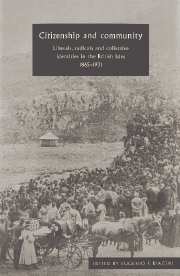 Citizenship and Community
Citizenship and Community Published online by Cambridge University Press: 16 September 2009
Liberalism is often described as a body of strictly individualistic doctrines based on, and aimed at, the defence of personal rights and liberties, intended as ‘absence of restraint’. Furthermore, it is usually assumed that there was a ‘crucial moral opposition’ between such individualism and the ‘classical republican’ (Aristotelian) concept of active citizenship typical of democratic and socialist movements. And yet over the past few years this assumption has come under increasing attack from different quarters. Quentin Skinner has demonstrated that the republican tradition included a considerable emphasis on liberal individualism, while more recently I have argued for both a community dimension and a passionate attachment to ‘positive’ liberty as characterising Gladstonian popular liberalism. A question now to be addressed is whether the latter sat midway between the ‘liberal’ and ‘republican’ traditions, or whether the dichotomy between these traditions is just not applicable to British liberalism.
The case of J. S. Mill is almost an ideal one for exploring this question. Not only was he the leading ‘libertarian’ of his day, but he also paved the way towards experiments in collectivism, and by the end of his career was supposed to have become a kind of socialist. Not surprisingly, scholars have long questioned Mill's consistency, as well as the dynamic of what can be seen as his systematic eclecticism. Curiously, the common thread linking the traditions on which Mill drew has been overlooked: it was a version of the ‘classical republican’ model which held the key position in Mill's liberalism, and had wide-ranging implications for his attitudes to the issue of liberty and public control in a free society.
To save this book to your Kindle, first ensure no-reply@cambridge.org is added to your Approved Personal Document E-mail List under your Personal Document Settings on the Manage Your Content and Devices page of your Amazon account. Then enter the ‘name’ part of your Kindle email address below. Find out more about saving to your Kindle.
Note you can select to save to either the @free.kindle.com or @kindle.com variations. ‘@free.kindle.com’ emails are free but can only be saved to your device when it is connected to wi-fi. ‘@kindle.com’ emails can be delivered even when you are not connected to wi-fi, but note that service fees apply.
Find out more about the Kindle Personal Document Service.
To save content items to your account, please confirm that you agree to abide by our usage policies. If this is the first time you use this feature, you will be asked to authorise Cambridge Core to connect with your account. Find out more about saving content to Dropbox.
To save content items to your account, please confirm that you agree to abide by our usage policies. If this is the first time you use this feature, you will be asked to authorise Cambridge Core to connect with your account. Find out more about saving content to Google Drive.